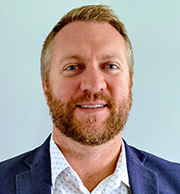
School Counseling When Life Is Hard
By Josh Smith | March 2022
 I still have a vivid memory of the doctor walking into the exam room where I was waiting. They’d taken some scans of my abdomen because I’d been experiencing some intense stomach pain. He walked in, asked a few questions that seemed unrelated, and then matter-of-factly told me they found a tumor in my colon. That was hard to take being that I’d already had cancer once, four years previously.
I still have a vivid memory of the doctor walking into the exam room where I was waiting. They’d taken some scans of my abdomen because I’d been experiencing some intense stomach pain. He walked in, asked a few questions that seemed unrelated, and then matter-of-factly told me they found a tumor in my colon. That was hard to take being that I’d already had cancer once, four years previously.For the second time in my life I was facing surgery, a stay in the hospital and chemo. The first diagnosis came in a slightly less dramatic way, but it was still shocking to hear that horrible C word. It changes a lot of things in your life when you hear cancer. I’m sure that some of you or someone you love has encountered that word and suffered the consequences. We all hate cancer.
Although that may seem like a strange way to start an article from MSCA, I share it with two things in mind. First, transparently, I want to capture your attention. Second, I want to use this as a springboard to discuss how to be an effective school counselor while surrounded by life’s uncertainty. I was fighting cancer but I still wanted to be an effective school counselor. When the heaviness of life is weighing us down, it can be difficult to engage our students in meaningful ways.
We all face uncertainty to some degree. We often experience it on a spectrum or continuum. At different points in our lives, uncertainty can vary from mild to extreme. I've found in working with students that in today's context, uncertainties often come from 3 P’s – the pandemic, people and personal experience. Each one of these influences us in different ways, but for this article I focus on personal uncertainty.
How do you stay an effective school counselor when we are battling uncertainty ourselves?
At different times in my life (as referred to earlier) I faced personal health concerns. However, I know uncertainty also comes in the form of a sick child at home while you're at the office, self-doubt because of a difficult or harsh administrator, or palpable strain because of the tensioned place we occupy between the administrators and teaching staff – the list goes on. But we still have to be effective even when there is chaos in our lives.
So how do we do this? Allow me to draw from my experience of beating cancer (twice) and offer three suggestions.
- It’s OK to be helped.
We are living in a self-sufficient society where it’s easy to think we’re in control of everything. We feel like if we eat right and exercise we’ll be healthy. If we invest right and budget we’ll be wealthy. If we work harder we’ll be more successful. Life, however, teaches us otherwise. While these are all good things that influence our lives for the better, sometimes the lesson is that we are not in control. For this reason, the first lesson I’ve learned and suggest for you is to accept help. When others offer, say yes. Delegating or accepting help may seem counterproductive at times when we already know what we’re doing, but allowing people to help is mutually beneficial. - Be honest with yourself and others.
Don’t keep telling your fellow counselors that you’re fine if you’re not. When your principal asks if you’re okay or need anything, be authentic. That doesn’t mean we exhibit every emotion we feel or cry on everyone's shoulders, but it does mean we are true to ourselves. It’s good to say things like, “Truthfully, I’m overwhelmed right now,” or “To be honest, I’m struggling with my work life balance,” or “I’m not gonna lie; there’s a lot on my plate.” Consider for a few minutes how refreshing it would be if you were honest with yourself first and then others at the school. It’s also good to follow up those statements by asking for suggestions or insight. Any good colleague or principal is going to show care and concern that will ultimately provide a supportive environment so that you can continue to function effectively and care for your students. - Go to counseling.
Put the oxygen mask on yourself first (if you can remember what flying in planes was like). Get your help so you can help others. Don’t forget that doctors need other doctors for their physical health. Sucker punch the stigma that mental health workers should know how to counsel themselves. We need to take our own advice. If you haven’t done this already, seek out a good counselor. Let’s make personal uncertainty something we can float through instead of fight. Remember, one of the silver linings of COVID-19 is that virtual counseling is covered by most insurances and essentially opens you up to counselors across the state! This means counseling is now more convenient and easier to access than ever before.